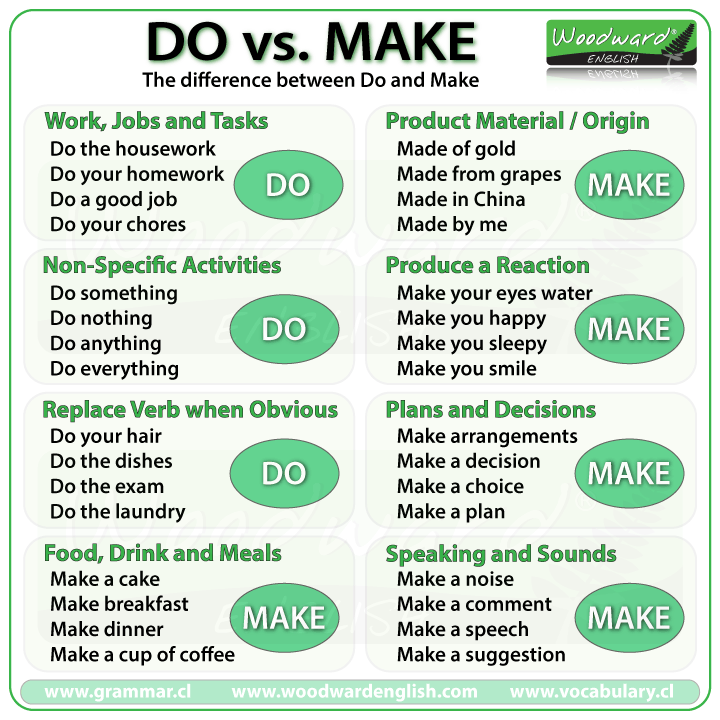Después de aprender Comparatives and Superlatives, en esta lección aprenderemos Do vs Make.
Do y Make son dos verbos que confunden con frecuencia a los estudiantes. Aquí aprenderemos sobre la diferencia entre Do y Make y cuándo usar cada uno.
When do you use DO?
DO is used as follows:
1. DO is used when talking about work, jobs or tasks. Note, they do not produce any physical object.
- Have you done your homework?
- I have guests visiting tonight so I should start doing the housework now.
- I wouldn’t like to do that job.
2. DO is used when we refer to activities in general without being specific. In these cases, we normally use words like thing, something, nothing, anything, everything etc.
- Hurry up! I’ve got things to do!
- Don’t just stand there – do something!
- Is there anything I can do to help you?
3. We sometimes use DO to replace a verb when the meaning is clear or obvious. This is more common in informal spoken English:
- Do I need to do my hair? (do = brush or comb)
- Have you done the dishes yet? (done = washed)
- I’ll do the kitchen if you do the lawns (do = clean, do = mow)
Remember Do can also be as an auxiliary verb (for making questions in the present tense – Do you like chocolate?) For more about Do used in this case, see our page about Do vs Does. Here we will be talking about Do as a normal verb
When do you use MAKE?
Make is for producing, constructing, creating or building something new.
It is also used to indicate the origin of a product or the materials that are used to make something.
- His wedding ring is made of gold.
- The house was made of adobe.
- Wine is made from grapes.
- The watches were made in Switzerland
We also use Make for producing an action or reaction:
- Onions make your eyes water.
- You make me happy.
- It’s not my fault. My brother made me do it!
You make before certain nouns about plans and decisions:
- He has made arrangements to finish work early.
- They’re making plans for the weekend.
- You need to make a decision right now.
We use Make with nouns about speaking and certain sounds:
- She made a nice comment about my dress.
- The baby is asleep so don’t make any noise.
- Can I use your phone to make a call?
- Don’t make a promise that you cannot keep.
We use Make with Food, Drink and Meals:
- I made a cake for her birthday.
- She made a cup of tea.
- I must go now. I have to make dinner.
Compare Do and Make
A: You have to make a cake for Simon.
B: I’ll do it later.
Notice how in the response the verb DO is used. This is because the meaning is clear and to avoid saying “I’ll make it later.” which could sound repetitive.
Examples:

Este es el final del nível English Independent User (B2) regresa a la sección de cursos y comienza el nivel Proficient English User (C1)